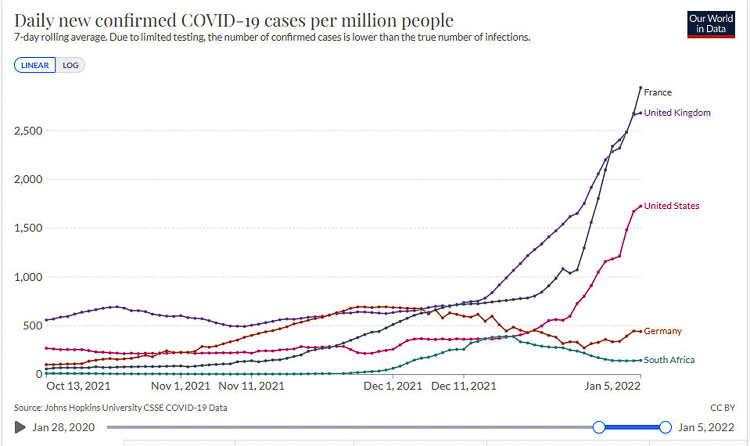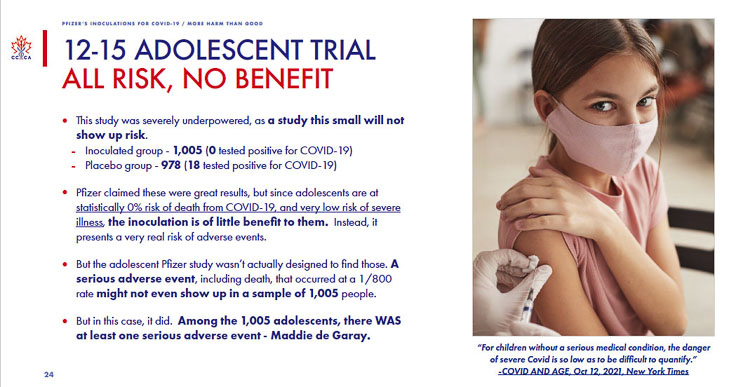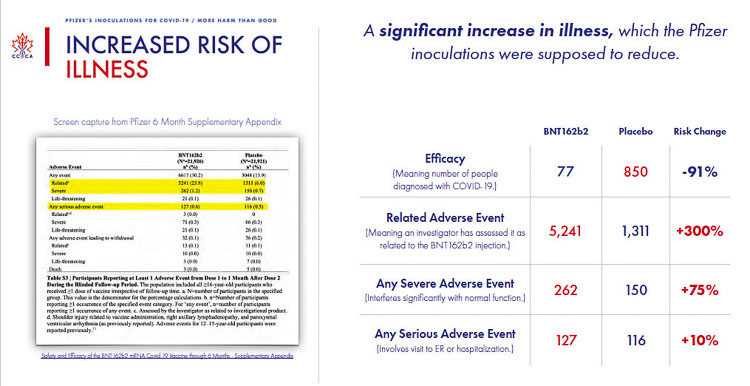Evidence suggests milder Omicron variant appears to ignore both vaccinated and natural immunity
The world is watching as the Omicron variant of the SARS-CoV-2 coronavirus races around the globe at breathtaking speed. The virus appears to have mutated so much that it ignores both vaccines and natural immunity from people who have recovered from COVID-19 sickness.
The answer most public health authorities have to this reality is to encourage a third and then possibly a fourth shot of the Pfizer or Moderna EUA approved vaccinations. Israel is now administering a fourth injection. The timeline between boosters continues to diminish as cases rise.
But the need for a “booster” is contradicted by data indicating the current inoculations do not prevent people from getting Omicron. Yakima E.R. physician Dr. Raul Garcia shared that he was vaccinated, he had gotten COVID earlier in the year, and then recently tested positive for Omicron.
Furthermore, all indications from South Africa where Omicron began, are very few people needed to be hospitalized due to sickness caused by the latest variant. Case numbers there have declined significantly according to a Dec. 30 statement.
“While the Omicron variant is highly transmissible, there has been lower rates of hospitalization than in previous waves,” the government said. “This means that the country has a spare capacity for admission of patients even for routine health services. There is a marginal increase in the number of deaths in all the provinces.”

The Vacuum of Truth
“The first step is to give up the illusion that the primary purpose of modern medical research is to improve Americans’ health most effectively and efficiently. In our opinion, the primary purpose of commercially funded clinical research is to maximize financial return on investment, not health.”
—John Abramson, M.D., Harvard Medical School
A Canadian group of over 500 healthcare professionals has put together a hard-hitting video alleging the Pfizer vaccinations do more harm than good. The Canadian Covid Care Alliance (CCCA) claims to support “independent, science based evidence to empower Canadians.” They hope hospitalizations can be reduced, lives saved, and their country can be safely restored to normal as quickly as possible.
The centerpiece of the claims are centered around Pfizer’s own data. “The Pfizer 6 month data shows that Pfizer’s COVID-19 inoculations cause more illness than they prevent,” says the CCCA. They also provide an overview of the Pfizer trial, alleging flaws in both design and execution.
In the US, Dr. Paul Marik and Dr. Pierre Kory held a “year in review” discussion at their Front Line Covid Critical Care Alliance (FLCCC) on Dec. 29. During the hour and 34 minute presentation and discussion, they talked about how unreliable the data in the US has been regarding COVID-19 and the pandemic.
“You have to look at the ‘all cause mortality’,” said Marik. Both he and Kory noted that the Pfizer data showed higher mortality among the vaccinated than the unvaccinated. “What’s astonishing, in the Pfizer study you were more likely to die if you were vaccinated than if you were unvaccinated,” Marik said. They also mentioned similar data from the U.K.
They also cited data from highly vaccinated Denmark showing Omicron attacks the vaccinated as much as it attacks the unvaccinated. A Danish doctor said 75 percent of the country’s Omicron patients are fully immunized with a two-dose vaccine, while 9 percent of Omicron positive patients have received a booster dose. At the time of the report, 99 percent of Omicron patients were not hospitalized.
“Free and open scientific discourse, and safe and effective vaccines begins with the most important premise in medicine, first, do no harm,” the CCC says in their opening.
Medical interventions approved by Health Canada must first be proven to be safe with due diligence and research. There is a need to adhere to the established protocols of the doctor-patient relationship, informed consent and scientific inquiry. “Deviating from those practices, causing harm and failing to disclose risks of harm is negligent,” they claim.
The CCCA lists evidence beginning with Pfizer’s two-month data report. It was published in the New England Journal of Medicine, Dec. 31, 2020.
Doctors Paul Marik and Pierre Kory discuss the data from Pfizer’s own trial and data from the UK which shows higher mortality for vaccinated individuals than the unvaccinated. Kory emphasizes there is a significant difference between early treatment and late treatment. Video courtesy FLCCC Alliance
The CCCA notes the report indicates there were 43,548 people in the report (not a controlled or randomized “study”). There was a treatment group that received inoculation, and a control group who received saline for two months, to see who developed COVID-19.
Pfizer made the claim that the inoculations were safe and showed 95 percent efficacy, seven days after the second dose. People think that means you’re protected 95 percent of the time, but that is wrong. The 95 percent was actually a Relative Risk Reduction (RRR). The Absolute Risk Reduction (ARR) was only 0.84 percent..
Relative risk reduction is well known to be a misleading number, according to the CCCA. “The FDA recommends using absolute risk reduction instead, which begs the question how many people would have chosen to take the COVID-19 vaccines had they understood that they offered less than 1 percent benefit?” the CCCA asked.
The numbers
In the Pfizer trial, eight out of 18,198 people who were given the vaccine developed COVID-19. In the unvaccinated placebo group 162 people got it. Even without the vaccine, the risk of contracting COVID-19 was extremely low at 0.88 percent which the vaccine then reduced to 0.04 percent.
The net benefit or the absolute risk reduction that you’re being offered with a Pfizer vaccine is 0.84 percent. That 95 percent number refers to the relative difference between 0.88 and 0.04 percent. That’s what Pfizer calls 95 percent relative risk reduction.
They note that Pfizer’s clinical trial did not test all participants for COVID. Instead, investigators were instructed to test only those with symptoms. This means asymptomatic infection was missed and results are unreliable due to the high level of subjectivity investigators had and their ability to manipulate results.
According to the CCCA, Pfizer’s clinical trial data shows a total of 20 deaths in the group that received the vaccine compared to 14 deaths in the placebo group.
Pfizer originally planned a three-year blind study of their vaccine with 42,000 participants. Half would get the vaccine and half would get a saline (placebo). The participants wouldn’t know which group they were in until the end of the 3 years.
Instead, Pfizer ended the initial phase of the study after just two months. They “unblinded” the study and offered people in the placebo group the opportunity to take the test vaccine. They had collected only two months of data instead of the planned 36 months of data.
The vast majority of the placebo group moved into the inoculated group. In early 2021, there was no longer a control group to compare with the inoculated group. For the rest of the trial, there was no way to assess long term effectiveness or safety.
The Canadian Covid Care Alliance explains the problems in the original Pfizer vaccine study and reveals data showing the Pfizer inoculation had more death than those who received the placebo. Video Courtesy CCC Alliance
The Pfizer six month data report came out September 15, 2021. This report indicated an efficacy of 91.3 percent, meaning the inoculated group showed a reduction in positive cases compared to the placebo group. But shockingly, the inoculated group also showed an increase in illness and deaths. “There’s no benefit to a reduction in cases, if it comes at a cost of increased illness and death,” the CCCA says.
Pfizer supposedly is missing data for thousands of participants (many of whom were suspected to have COVID in the vaccinated group but weren’t tested). If they were included it would have reduced the relative risk reduction to 19 percent — less than the 50 percent eligible for (Emergency Use Authorization) EUA.
Additionally, in the Pfizer group only 21 percent of study participants had a co-existing health condition. In the real world, 95 percent of those listed as dying from COVID had at least one comorbidity and the average was four comorbidity conditions.
They note the Pfizer study failed to track biomarkers for individual health issues that would have provided additional indications of reactions to the vaccine. These should have included d-dimers, C-reactive protein, troponins, blood oxygen levels, and more, according to the CCCA.
The lack of follow up data suggests there were an additional 1,594 “suspected cases” of inoculated people getting COVID plus another 80 participants “lost to follow up.” Including that data would have potentially changed the numbers to 1,672 vaccinated people getting the virus and 2,064 in the placebo group. The 95 percent difference between eight and 162 cases would have changed to a mere 19 percent advantage.
Children
According to CCCA, Pfizer also took results from their adult trial and added them to the results of the 12-15-year-olds trial, despite that adolescent trial starting four months later. The result was boosted efficacy numbers and inaccurate reporting of risks and benefits for children.
Pfizer’s study of adolescents aged 12 to 15 was too small to show risk and showed no benefit — only 1,005 participants were vaccinated and 978 received the placebo.
Pfizer boasted about great results but the adolescents they tested were at a statistically zero percent risk of death from COVID. Getting the vaccine injection wouldn’t have benefited them in the first place. What the vaccine did do was increase the risk of adverse events, which the clinical trial wasn’t designed to detect.
There was at least one very serious adverse event — 12-year-old Maddie de Garay. “Maddie developed gastroparesis, nausea and vomiting, erratic blood pressure, memory loss, brain fog, headaches, dizziness, fainting, seizures, verbal and motor tics, menstrual cycle issues, lost feeling from the waist down, lost bowel and bladder control and had a nasogastric tube placed because she lost her ability to eat,” according to multiple news reports. She has been in a wheelchair and fed via tube ever since.
In Pfizer’s report, her adverse reaction was described as “functional abdominal pain,” rather than the significant health problems Maddie and her family are now dealing with.

Pfizer also used predictive modeling and stated their vaccine will cause myocarditis but said there would be zero deaths. This violates the first principle of medicine (do no harm) and science shows a mortality rate of 20 percent at 6.5 years in those who have myocarditis.
Medical interventions are supposed to be proven safe before they are rolled out in the population. Yet Dr. Eric Rubin, one of the 18 members of the FDA advisory panel who voted to approve the inoculations for children 5-11, actually said the opposite. He suggested that a population level roll out was an appropriate way to test for adverse events. Rubin is the editor-in-chief of the New England Journal of Medicine, which published the Pfizer trial reports.
The CDC has now authorized booster shots of the Pfizer injection for teen youth ages 12-17. They claim data shows that “COVID-19 boosters help broaden and strengthen protection against Omicron and other SARS-CoV-2 variants.”
Pfizer proclaims the inoculations are safe, yet the data is not there to back that claim up. In addition to admitting that their inoculations can cause myocarditis, Pfizer also admits in their report, that their long-term immune response, efficacy and safety data is limited and that their studies weren’t powered to find “rare” side effects in 5-11 year olds, as only 1,517 kids got the inoculation.
Questions continue to be raised
On Nov. 2, the British Medical Journal published an article about their investigation into Ventavia, one of the research companies Pfizer hired to conduct the trials. It’s quite damning.
The whistleblower is a Regional Director who actually reported her company to the FDA alleging:
• Falsifying data
• Unblinding participants
• Not following up and testing participants who reported symptoms
• Mislabelling specimens
Several other employees backed up her account, according to the report. Despite all this, neither Pfizer, nor the FDA audited or investigated the research company, according to the CCCA. Pfizer never disclosed the problems in its EUA application, and in fact, Pfizer has now hired that same researcher, Ventavia, to run four more COVID-19 clinical trials.

The CCCA reports Ontario (Canada) Public Health recommended young men 18-24 not take the Moderna shot, because of a 1 in 5,000 risk of myocarditis. They suggested Pfizer shot instead, which has a 1 in 28,000 risk of myocarditis.
But as recently as May 8, 2021, Ontario had stopped allowing the AstraZeneca shot because of a 1 in 60,000 risk of clotting side effects, which was considered too high.
The CCCA notes a long history of Pfizer paying billions in lawsuit damages, as part of their “follow the money” in the report. They note Pfizer made $33 billion in 2021, and continues to get lucrative government contracts related to COVID-19.
They note the CDC has redefined “vaccine” so that it no longer provides immunity, benefiting political and pharmaceutical interests.
Questions continue to arise about effective treatments, the ongoing “emergency” declarations from Gov. Jay Inslee, the state and local public health officials, and the federal government handing out money.
The politics of fear have been noted by many, including CCT’s Heidi Wetzler. Learn about Mass Formation Psychosis here.
Here is the complete 39 minute video presentation by the Canadian Covid Care Alliance.
Also read:
Opinion: How have we gotten here? Mass Formation Psychosis, explained










